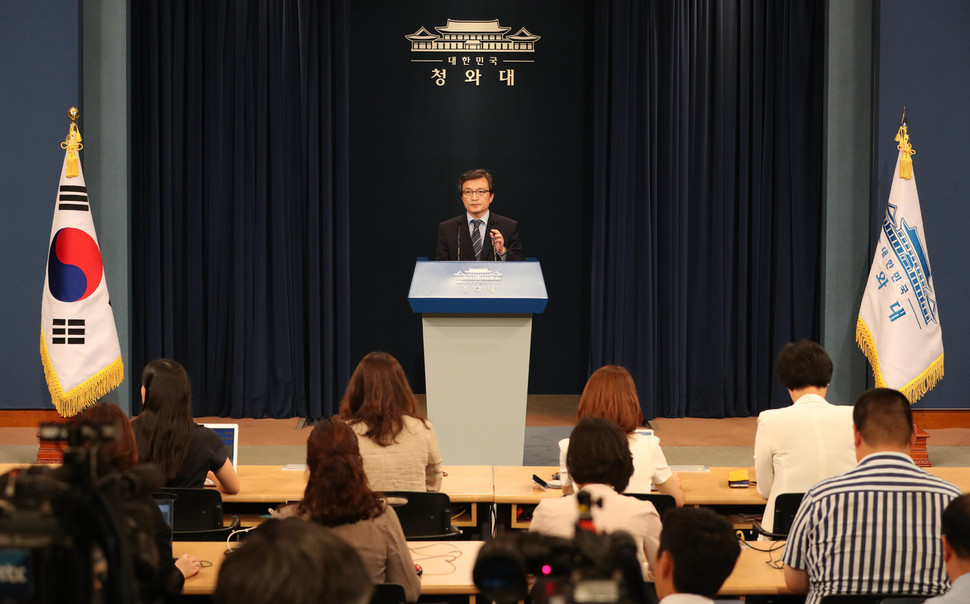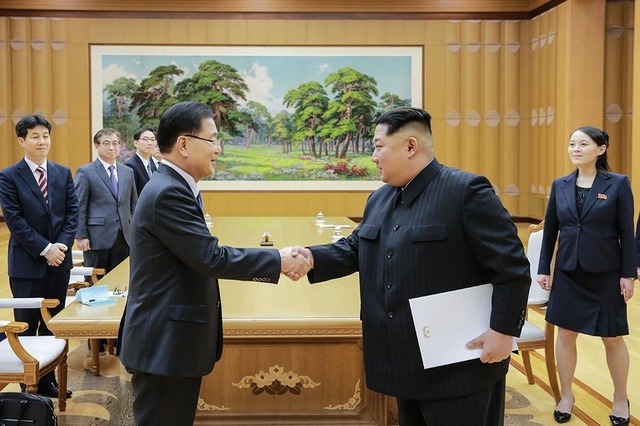 |
|
Blue House Spokesperson Kim Eui-kyum during a daily briefing at the Blue House’s press room on Aug. 31. (Kim Jung-hyo, staff photographer)
|
North Korea accepted proposal to receive delegation on Sept. 5, Blue House says
South Korean President Moon Jae-in has decided to send a special delegation to Pyongyang on Sept. 5 to discuss the schedule of the inter-Korean summit, which is supposed to be held in Pyongyang this month, and ways to establish peace and achieve denuclearization on the Korean Peninsula.
“At 10:30 this morning, the South Korean government sent a message to North Korea in which President Moon proposed sending a special delegation on Sept. 5. The North Koreans received the message and accepted the offer about the special delegation in a response that afternoon,” Blue House spokesperson Kim Eui-kyum said during the daily briefing on Aug. 31.
This will be the second special delegation sent to Pyongyang, after Chung Eui-yong, Director of the Blue House National Security Office, and Suh Hoon, Director of the National Intelligence Service (NIS), visited in March, met with North Korean leader Kim Jong-un and arranged to hold an inter-Korean summit in Panmunjom at the end of April.
Moon’s decision to send a special delegation to Pyongyang indicates his determination to break through the deadlock in the North Korea-US denuclearization talks and to use improving inter-Korean relations as a catalyst for North Korea-US relations. This represents his bid to be a mediator and a facilitator in the challenging circumstances surrounding the Korean Peninsula.
It was Moon who proposed sending special envoys to the North. He appears to have settled on this idea after the deadlock between North Korea and the US over denuclearization and the armistice agreement complicated efforts to implement the Apr. 27 Panmunjom Declaration and made it impossible to guarantee that the inter-Korean summit in Pyongyang in September would produce any results.
After the US failed to narrow its differences with North Korea in the denuclearization talks, it abruptly canceled Secretary of State Mike Pompeo’s trip to the North, which had been planned for the end of August, and raised the possibility of resuming joint military exercises with South Korea. This has also delayed the opening of the inter-Korean liaison office in Kaesong and obstructed an inter-Korean joint inspection of the North Korean section of the Gyeongui railroad line.
 |
|
Chung Eui-yong, Director of the Blue House National Security Office and head of the special delegation ahead of the Apr. 27 inter-Korean summit, (front, left side) shakes hands with North Korean leader Kim Jong-un during a visit to Pyongyang on Mar. 5. Kim is seen holding a letter from South Korean President Moon Jae-in. Sanding on the far right is Kim Yo-jong, Deputy Director of the Central Committee of the Workers‘ Party of Korea (WPK). (provided by the Blue House)
|
Date of Sept. 5 chosen to avoid North Korea’s foundation day
“It was apparently concluded that no further delay could be allowed if the agreement to hold an inter-Korean summit in Pyongyang in September is to be kept,” Kim Eui-kyum said. In short, Seoul is taking the current situation very seriously and has concluded that it must take the first step toward reaching a breakthrough.
In addition, the Blue House appears to have chosen to send the special delegation on Sept. 5 in order to avoid Sept. 9, North Korea’s Day of the Foundation of the Republic. If the special delegation’s visit to Pyongyang were to coincide with the Sept. 9 holiday, it might be confused as a delegation to the celebration of the 70th anniversary of the establishment of the North Korean government.
Moon probably means to have the special envoys attempt to determine North Korea’s real intentions in regard to denuclearization and the armistice agreement.
“A special envoy stands in proxy for the supreme leader. Indirect dialogue between the leaders of South and North Korea can enable the candid exchange of opinions that was impossible in the high-level talks. All aspects of all issues, including denuclearization, will be addressed,” a senior official at the Blue House said.
“[The special envoy] needs to go equipped with a plan for mediating the disagreement between North Korea and the US over denuclearization. They need to persuade North Korea and tell the US [about the results],” said Cho Sung-ryul, senior research fellow for the Institute for National Security Strategy.
“[At the current stage,] South and North Korea need to talk about what they can do for each other, and [the South] needs to listen to North Korea’s position about its relations with the US,” said Lee Jung-chul, a professor at Soongsil University.
Circumstances have expanded Moon’s role as mediator
In addition, Moon will probably attempt to finalize the schedule for the inter-Korean summit in September, a matter about which no agreement was reached during the high-level talks on Aug. 13. Moon regards the inter-Korean summit as an indispensable step toward the complete denuclearization of the Korean Peninsula, an end-of-war declaration and a peace treaty.
“The development of inter-Korean relations is not a by-product of progress on North Korea-US relations – it is itself a dynamo driving the denuclearization of the Korean Peninsula,” Moon said during his celebratory address on Aug. 15, South Korea’s Liberation Day, communicating his firm determination to use the development of inter-Korean relations to propel denuclearization.
“The strain on North Korea-US relations has if anything expanded President Moon’s role as a facilitator and mediator in clearing the hurdles and increasing the scope of understanding between North Korea and the US,” said Kim Eui-kyum after the cancellation of Pompeo’s visit to the North at the end of August.
Likely candidates for delegation
The Blue House said that the number of people in the special delegation to North Korea and their identities have not been decided yet. Even so, Chung Eui-yong and Suh Hoon, who already met with Kim Jong-un as part of a special delegation to the North this past March, are likely to play a significant role once again. The two figures are in charge of South Korea’s relations with the US and North Korea, respectively. In addition to these two figures, the previous special delegation included Vice Minister of Unification Chun Hae-sung, NIS Second Deputy Director Kim Sang-gyun and Blue House Governance Situation Room Director Yun Geon-yeong, among others.
Another contender is Park Seon-won, special aide to the NIS director, who was relocated from the South Korean Consulate General in Shanghai in July. Given the gravity of the situation, some think that Im Jong-seok, Moon’s chief of staff, might be on the team, too.
“We have some ideas about this, but they haven’t been decided yet,” said the Blue House, while declining to comment about the North Korean figures whom the special delegation would meet. But considering that the previous delegation met Kim Jong-un, he’s a leading contender.
By Seong Yeong-cheol and Kim Ji-eun, staff reporters
Please direct comments or questions to [english@hani.co.kr]










